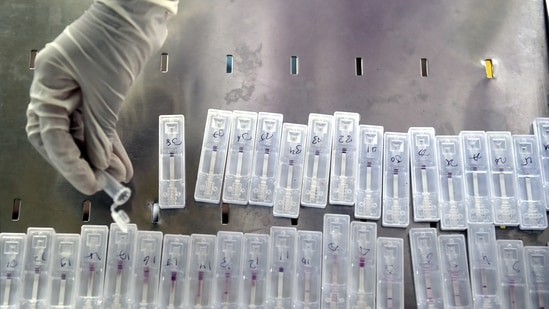0.03%: Positivity rates at two private labs 450 times lower than average during Kumbh mela
The data also showed that apart from the two facilities – Delhi-based Lalchandani Labs and Hisar-based Nalwa Labs – named in the FIR last week, a number of other private labs also reported very low positivity rates.
Two private labs in the dock for allegedly conducting fake Covid-19 antigen tests during the Mahakumbh in April reported positivity rates of 0.03% during the holy event, roughly 450 times lower than the average positivity rate in Uttarakhand at the time, official data accessed by HT showed on Tuesday.

The data also showed that apart from the two facilities – Delhi-based Lalchandani Labs and Hisar-based Nalwa Labs – named in the FIR last week, a number of other private labs also reported very low positivity rates.
In all, 11 labs were contracted by the mela authorities to conduct Covid-19 tests during Kumbh but only two were named in police complaints. Positivity rates are a ratio of the number of Covid-positive results to number of tests conducted, and are a measure of disease outbreak severity in an area.
Data from the mela administration showed that the 11 labs carried out 207,000 antigen tests between April 1 and 30 and reported an overall positivity rate of 0.49%.
For reverse transcription polymerase chain reaction (RT-PCR) tests – considered the gold standard of Covid-19 testing and more reliable than rapid tests – the labs carried out 44,278 tests and reported a positivity rate of 2.82%.
In all, private labs carried out 251,000 Covid-19 tests during the mela and found 2,273 infections at a positivity rate of 0.90%. At the time, the average test positivity rate in Haridwar was 4%, and that of Uttarakhand was 13.7%.
Roughly 9.1 million devotees took the holy dip this year and six million of this was in April, coinciding with a devastating surge in infections across the country.
Data showed that Nalwa Labs carried out roughly half – 104,000 – of all antigen tests and reported 0.033% positivity. Lalchandani Labs carried out 13,992 antigen tests and reported 0.028% positivity.
Haridwar district magistrate C Ravishankar, who is monitoring a three-member probe into the allegations, said the low numbers should have raised eyebrows. “Prima facie it was suspicious that a single lab carried out over 1 lakh tests in less than a month when other labs were nowhere close,” he said.
When it came to RT-PCR, Nalwa carried out 5,782 tests and detected 29 infected cases, a positivity rate of 0.50%. Lalchandani Labs didn’t conduct any RT-PCR tests.
The data pointed out that a number of private labs not named in the FIRs also reported low positivity rates.
For example, two labs detected just one positive case throughout the month and reported antigen positivity rates of 0.064% and 0.087%. Roughly 93% of all rapid tests conducted at the mela were done by six labs that reported a combined positivity rate of 0.23%. The highest antigen positivity rate of 12.69%was reported by a Delhi-based lab that carried out 1,426 tests and found 181 infections.
Ravishankar said that the low positivity rates were likely missed by officials because the focus was on carrying out as many tests as possible to ensure no infected people were visiting the mela. “It could be possible that no one noticed it (the unusually low positivity rate) because we were just coming from a time when cases were still low. Also, antigen tests usually report few positives,” he said.
For RT-PCR tests, a Meerut-based lab reported the lowest positivity rate of 0.1% after carrying out 2,894 tests and finding only three infections. Overall, 44,278 RT-PCR tests were carried out by private labs and 1,250 people were found to be positive at a rate of 2.82%.
Allegations of fake testing surfaced at the Kumbh last week after a Faridkot resident complained to the authorities that he received a message for collecting his Covid-19 report despite never having been tested. The complaint triggered a probe that unearthed roughly 100,000 fake rapid antigen tests. Three firms – Lalchandani Lab, Nalwa Lab and Noida-based private agency Max Corporate Services – were booked last week.
At present, three separate probes are looking at the allegations: one by the police, one by the district administration and one by the mela administration.
Police said their investigation – which is currently looking at the two labs -- will expand to probe all tests carried out by private labs. “Our aim is to find the truth about these tests. We are beginning our probe with the two labs mentioned in the FIR, and will expand our investigation to all the private labs,” said Senthil Avoodai Krishnaraj, senior superintendent of police (SSP) of Haridwar.
Ravishankar said that the probe could expand as well. “It could be due to wrong testing methodology or any other errors, but no lab has been given a clean chit. Right now we have begun with the two labs, but will move to probe other labs as well, if needed,” said the officer.
A mela administration officer, who did not want to be identified, said that errors could be because of the short period in which these testing camps had to be set up at the borders and in mela premises.
Mela health officer Arjun Sengar cited the ongoing probe to refuse comment. Harbeer Singh, additional mela officer, said, “The issue is under probe and it is not appropriate for me to comment on it. But the probe is happening at multiple levels and action will be taken if any loophole emerges.”
Nalwa Labs and Lalchandani Labs have rejected the allegations and approached the Uttarakhand high court to quash the FIR. Max Corporate Services also moved the high court, arguing that it was a service provider and only labs were authorised to conduct testing and uploading results on the government portal.






